Digital ID: Harnessing the potential of new digital forms of identification: Call for Evidence
The UK Home Affairs Select Committee has launched an inquiry into Digital ID. The deadline is 21 August 2025 and it's important we all respond.
The UK Home Affairs Select Committee has launched an inquiry into Digital ID. The deadline is tomorrow, Thursday 21 August 2025, and it's important we all respond.
Here is a link to the specific questions they are consulting on: https://committees.parliament.uk/call-for-evidence/3678/
And these are the questions they are asking:
I strongly encourage everybody reading this to consider their thoughts on these questions, and to share them with the Home Affairs Select Committee now. If we wind up having digital ID forced on us, and you didn’t share your concerns now when given the opportunity, you’re not well placed to complain.
If it helps any, here is my response to the questions but - and this is very important - you should not copy it verbatim, you must write your own response in your own words. If you don’t then it will probably be discounted as the guidance on the next page specifically states:
So, turning to…
My Response
Dear Sir or Madam
Re: Call for Evidence: Harnessing the potential of new digital forms of identification
I am writing further to your call for evidence at https://committees.parliament.uk/call-for-evidence/3678/.
My professional background is in IT at a senior level, primarily working on an interim and consultancy basis. I have advised boards of heavily regulated multinational businesses, in addition to working directly with government departments (both civilian and military) etc. I have lifelong professional experience of successfully predicting “scope creep” where a technology is initially introduced for one purpose, and is subsequently developed to do many other things that fall outside the original proposal.
I shall attempt to address each of your questions in turn.
Question 1
I believe data is currently being shared very effectively. There is not a government department that I have encountered in recent years that has not required either my passport or driving licence be provided as proof of ID. This burden has even extended to my local library so my borrowing can be tracked, and every financial institution. And as such every one of those activities is easily interlinked through those two unique government-issued IDs.
Every department from DVLA, through DWP and HMRC, to Passport Office has gone further than that though, and has insisted (on various pretexts inter alia 2FA) that I provide my mobile phone number as part of the interaction. Their websites effectively make it impossible to deal with them without doing this.
You will appreciate that a mobile phone number is (like a driving licence number or passport number) a globally unique identifier, and invariably tied to a single person. Further that because of the manner in which people tend to use their smartphones, knowing this unique identifying information makes it very easy for the Home Office to track that individual’s activity, not just across government departments but also across other independent websites (everything from mail order deliveries, through social media accounts and TV viewing, to phone call history) and of course their physical location through geo/proximity tracking (through phone masts, WiFi polling and Bluetooth scans depending upon the granularity desired).
I therefore believe that the Home Office and its associated agencies currently have more than sufficient information to track every single aspect of an individual’s life should they wish to. An individual in modern day Britain already has far less privacy than most people realise.
Question 2
Almost every law abiding citizen already has, and can present on request, either passport or driving licence. And every government organisation from Companies House (see new PSC regulations) to my local library, through police to banks, is now as accustomed to asking for sight of this personal ID as people are to providing them on demand. This is more than sufficient to establish a person’s identity for all reasonable purposes.
Any person entering our country legally will have similar identity documents from their own country of origin, and will be able to show them on demand. And it would be unreasonable and disproportionate to ask a visitor on a 2 week holiday, or a 2 day business trip, to present more than this. Those entering for longer already have e.g. finacee visa or similar in their passport, so again there is no need for a digital solution on top of that.
Any person entering our country illegally will have done so without using any of their own nation’s identity papers. And because of our island location will likely have crossed through the borders of, and across, other nation states first, also without the use of identity papers. It is thus ludicrous to suggest that they will suddenly be properly controlled with a digital ID, even assuming they can be found in the first place! Digital ID is clearly not, and can never be, a solution to illegal immigration.
My concern here then is not any slight potential benefits, of which I see none, but rather the massive increase in risk to honest citizens with the inevitable scope creep that will occur over time. History clearly shows us that however well intended an initiative like this may be at the outset, it will ultimately be twisted to oppress honest citizens in an increasingly Orwellian overreach of state power. You only have to look at the millions of innocent and honest adults now being asked to relinquish their online privacy simply to access many websites, or lose access to those websites entirely after decades of trouble-free use, as a direct result of the Online Safety Act 2023, for a timely example of this.
Question 3
My concern here is that the very question of “What different categories of information about individuals could most usefully be included…” is at odds with the long-established principle of “Privacy By Design” which is intended to protect the individual citizen from excessive data collection/linking, and is explained here by UK Information Commissioner's Office as being a legal obligation under GDPR: https://ico.org.uk/for-organisations/uk-gdpr-guidance-and-resources/accountability-and-governance/guide-to-accountability-and-governance/data-protection-by-design-and-default/
The idea that information (data) will be included “because it can” and on the off-chance that it may someday be useful to somebody for something, is not only a probable breach of GDPR and thus unlawful (a protection which I appreciate government can legislate to remove) but is also simply inappropriate in a free and democratic society. It is fundamentally wrong that a government should know everything about a private citizen, while the government seeks to protect itself from citizens by means such as court injunctions and restrictions on freedom of speech from the citizens it is supposed to serve.
Any information captured by the government on a private citizen should be the absolute minimum required to deliver a service to that citizen, not a shred more. And it should be securely and irrevocably deleted as soon as its purpose has been served, not stored in perpetuity. It already far exceeds that with demands for mobile phone numbers (see question 1) when alternative and better mechanisms for two/multi-factor authentication (2FA/MFA) are readily available and more privacy respecting.
Question 4
There is a significant risk not just to privacy but also liberty where digital ID even exists, let alone is mandated. The ultimate example of threat to personal freedom can be seen in China’s infamous social credit system, which could not operate without the two key pillars of digital ID and CBDC. I strongly believe that to protect future generations from the possibility of state overreach by a future regime, whether through technology scope creep or planned intent, both of these technologies should be discounted as inappropriate and a clear and present threat to a free society.
The rapid (and I would suggest dangerously unchecked) rise of AI only serves to increase this threat to civil liberty, because of the increased potential for cross-platform, machine based decisions to be made.
And all this is before considering the possibility of a data breach, and all that implies.
It’s bad enough that the US firm Palantir has been given access to UK NHS records (https://goodlawproject.org/palantir-poised-to-cash-in-on-wes-streetings-nhs-plan/) and thereby the private and personal medical history of every person in UK. Was nothing learned from how Cambridge Analytica abused trust with publicly available information on Facebook, before handing our nation’s sensitive medical records to another firm founded on spying? And even that ignores the matter of taxpayer money being used to provide jobs outside UK, while our own economy suffers and people with it.
Certainly UK government cannot be trusted with sensitive personal data, as has most recently been demonstrated with its loss of thousands of Afghan records with which it was entrusted. And then its attempts at concealing its failings from the public with an injunction to prevent reporting, which is surely the final nail in the coffin of any possible trust. With a record like this, why would anyone think that UK government should be trusted with any sensitive data at all, let alone more of it?
Our government’s collection of data already demonstrably presents a huge threat to not just individual privacy, but also personal safety. They should not be trusted with more information still, but rather I believe there should be an inquiry to look at restricting the government’s access to information and cross-linking of it, and perhaps mandating its deletion. I appreciate this would prove unpopular with our own security agencies, themselves often shadowy and unaccountable to the public they are supposed to serve.
Question 5
Given the above risks and history of failures, it is already necessary for the Home Office to develop substantial improvements in both process and technology to ensure that all data it currently holds is safe from loss by whatever means. Clearly their systems are not currently sufficiently robust, i.e. they are not fit for purpose, and furthermore rather than reporting their failures they seek injunctions to conceal them. As such I do not believe that the Home Office can be trusted with the data it currently holds, and certainly should not be entrusted with more.
As to “take advantage of new forms of digital identification” this surely raises the question of whether the state should be using technology to better support individual citizens and their rights to privacy, freedom of expression etc.; or to surveil, control and restrict them? Given that we already have adequate forms of non-digital ID to support the former reasonable activity, I find it hard to imagine digital ID doing anything other than supporting the latter (and please also see my response to question 4).
Question 6
As I explained in my response to question 1, the state already has sufficient globally unique identifiers in the form of passport number, driving licence number, and mobile phone number to create all the cross-system links it can reasonably require to do the job that most people would expect of it.
With respect therefore the question here should not be “How could [...] digital identification improve efficiency and interactions between [...] Government departments?” because that presupposes that the most important thing in a society is the ability of government departments to interact with each other, to surveil and control citizens.
I fundamentally disagree with that, and believe that the primary duty of any elected body should be to serve the best interests of those that elected it, and that will not be achieved through spending millions (or even billions) of pounds on seeking to more tightly control those who elected it. Instead, the elected body should be resisting deep state’s ceaseless attempts to create fear, and further erode privacy and restrict individual freedoms, with the ever tighter controls that have crept in across my lifetime (please see references to scope creep elsewhere).
Question 7
The biggest single lesson is how those forms of digital identification have been used internationally not to support individual freedom, but to curtail both freedom and privacy. These are not desirable behaviours in any civilised society where government should exist to serve its people; rather they are behaviours typical of a totalitarian state intent on controlling its people in a technocracy.
Presuming that we currently live in a free and democratic society, and wish to continue doing so with government committed to working in the best interests of the people that elected it, what we see internationally (with China being the most obvious example) is that there is not and never will be any place for any technology which has even the potential (not necessarily current intent) to be later used to enable a future regime to more easily oppress the people. And any current government should legislate to ensure than can never happen, not seek to introduce one of the key pillars with digital ID.
Conclusion
In conclusion, I am strongly opposed both personally and professionally to any attempt to introduce compulsory ID (especially digital) into Great Britain. I was fortunate enough to grow up without this and I would like my children, grandchildren and those that follow to enjoy similar freedom. I am a patriotic Brit, and proud that our great nation has resisted the “papers please” oppression that exists elsewhere in the world. We should all be proud of this, and not seek to destroy it forever with digital ID which will come only at a huge cost – not just financial, but also privacy and freedom – to the British people for generations to come.
I see minimal if any benefit to digital ID, but massive risk from every imaginable angle.
Your truly,
Andrew Pearce
Uploading Your Response
Once you have written your letter, it’s simple to upload it by following this link:
https://committees.parliament.uk/submission/#/evidence/3678/preamble
and pressing the Continue button at the bottom of the page.
But note that you can’t upload a PDF:
We’ll discuss why that might be another day!
Ultimately you’ll get an email like this, thanking you for your input:
Further Help
But like I said, please don’t just copy and paste my letter or your reply will likely be ignored. Please write your own letter, in your own words.
If you want more of a template to follow then #together has come to your rescue here:
https://togetherdeclaration.org/digital-id-how-to-respond-to-parliamentary-inquiry/
Although they too advise:
before sharing their template letter suggestion with you:
https://togetherdeclaration.org/digital-id-how-to-respond-to-parliamentary-inquiry/
You may note that I have answered all seven of the Select Committee’s questions, whereas the #together template letter only addresses three of them. This is why I have shared both letters with you, and why I encourage you to write your own response in your own words.
Further Action
Having gone to the trouble of responding, it would make sense to also email a copy of your letter to your MP so they understand your concerns. In my experience few MPs have a deep understanding of this subject, so your letter may provide them with welcome enlightenmet.
You can find your MP here:
https://members.parliament.uk/FindYourMP
Finally, if you want to better understand my answer to the Select Committee’s Question 1, then this article from January 2025 explains it:
UK Passport Office Data Harvesting
I recently had cause to use the UK Government Passport Office website to renew a passport. It’s a pretty slick website (other than the need to complete everything in one go, because there’s no ability to save a part-completed application and return) and the passport was printed and posted out quickly too. And thanks to the Royal Mail it even dropped thr…
For now though the most important thing is that you respond to the Digital ID Enquiry before it closes tomorrow, Thursday 21 August 2025:
https://committees.parliament.uk/call-for-evidence/3678/
And of course please share this post with others, and encourage them to respond too.
UPDATE 26 August 2025: My Liberal Democrat MP has responded to the above letter of which I sent him a copy. You can read his response here:
Digital ID Consultation - Lib Dem MP's Response
If you’re a regular reader you’ll know that a few days ago I responded to the UK government’s public consultation on the matter of digital ID, and encouraged others to as well. If you missed that article, you can read it here.


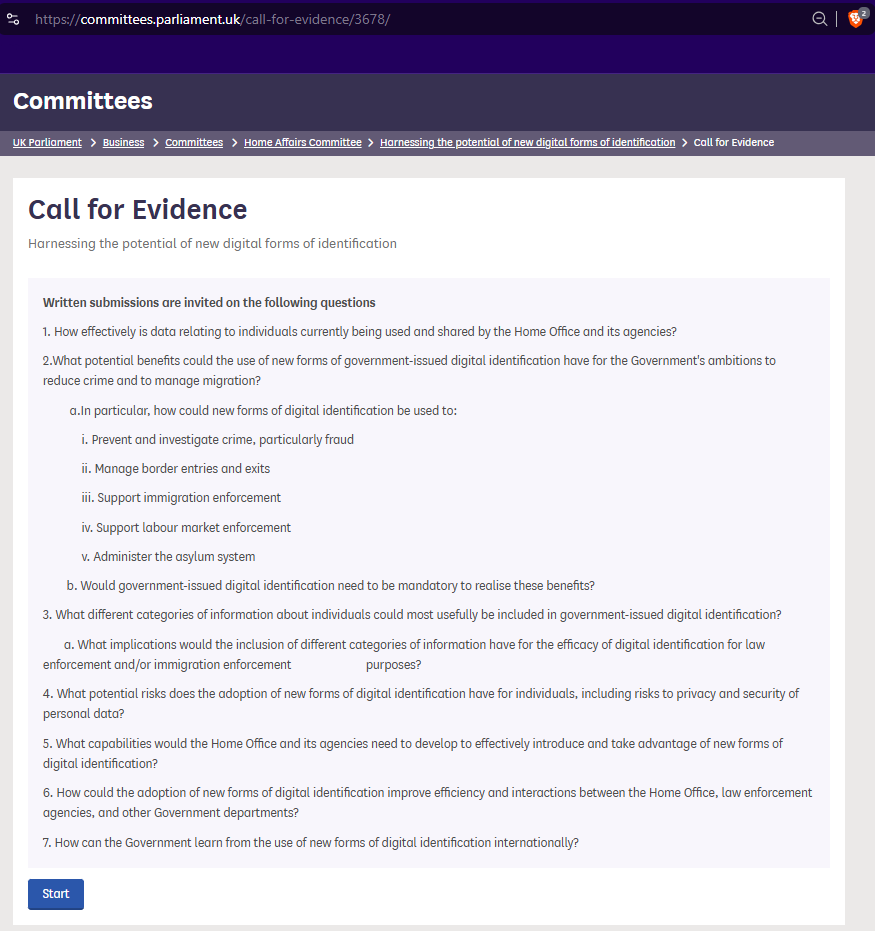

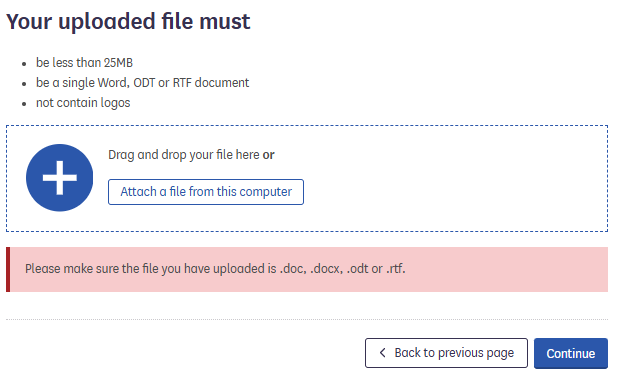
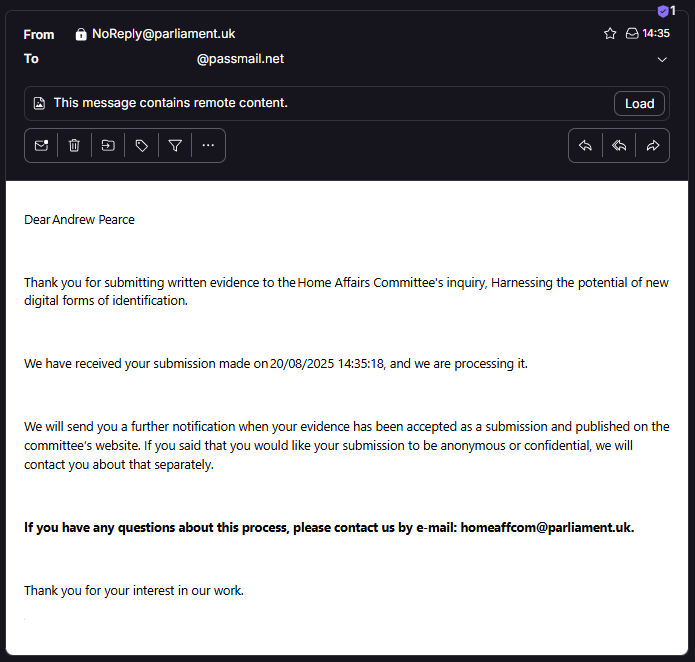

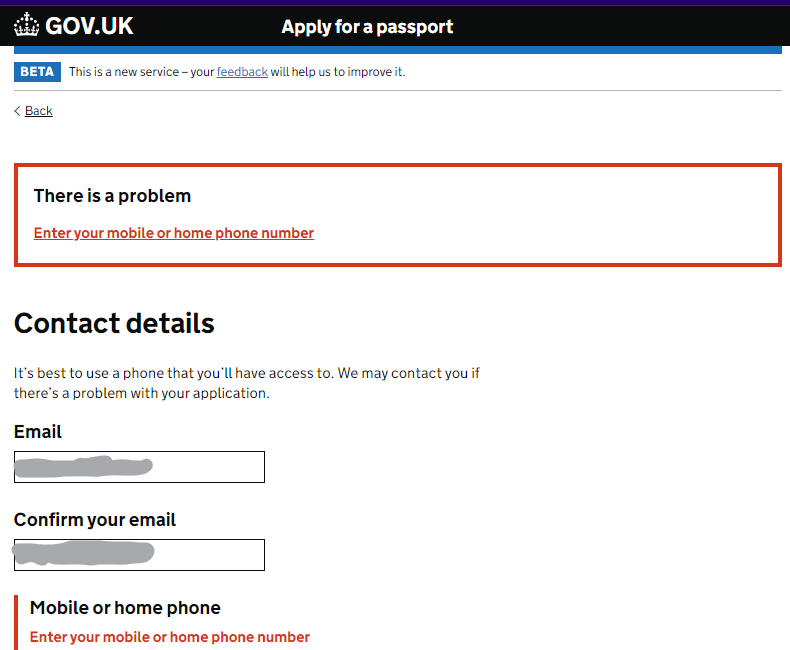
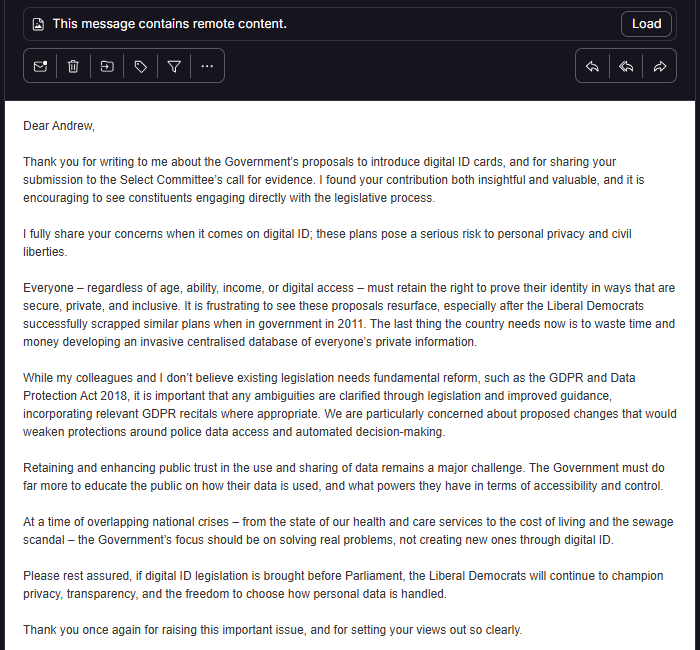
Andrew your friend Lisa here.
You will understand how important what i put together here is.
https://open.substack.com/pub/lawyerlisa/p/decoded-uk-j6-caught-it-all-on-film?r=3kbp6&utm_campaign=post&utm_medium=web&showWelcomeOnShare=false